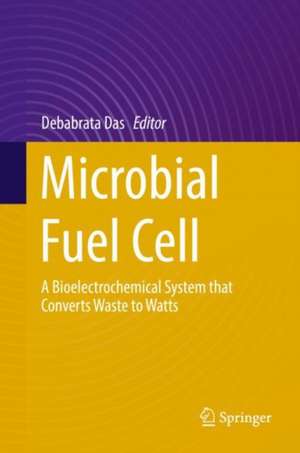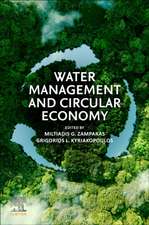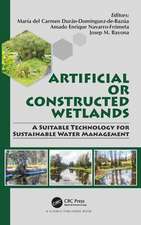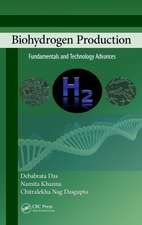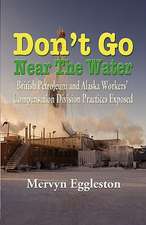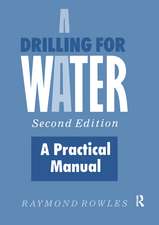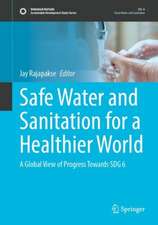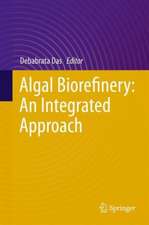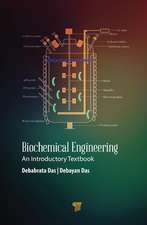Microbial Fuel Cell: A Bioelectrochemical System that Converts Waste to Watts
Editat de Debabrata Dasen Limba Engleză Hardback – 14 dec 2017
The book provides a detailed description of MFC technologies and their applications, along with the theories underlying the electron transfer mechanisms, the biochemistry and the microbiology involved, and the material characteristics of the anode, cathode and separator. It is intended for a broad audience, mainly undergraduates, postgraduates, energy researchers, scientists working in industry and at research organizations, energy specialists, policymakers, and anyone else interested in the latest developments concerning MFCs.
Preț: 1128.89 lei
Preț vechi: 1376.69 lei
-18% Nou
Puncte Express: 1693
Preț estimativ în valută:
216.01€ • 225.53$ • 178.78£
216.01€ • 225.53$ • 178.78£
Carte disponibilă
Livrare economică 15-29 martie
Preluare comenzi: 021 569.72.76
Specificații
ISBN-13: 9783319667928
ISBN-10: 3319667920
Pagini: 506
Ilustrații: XIX, 506 p. 111 illus., 17 illus. in color.
Dimensiuni: 155 x 235 mm
Greutate: 1.02 kg
Ediția:1st ed. 2018
Editura: Springer International Publishing
Colecția Springer
Locul publicării:Cham, Switzerland
ISBN-10: 3319667920
Pagini: 506
Ilustrații: XIX, 506 p. 111 illus., 17 illus. in color.
Dimensiuni: 155 x 235 mm
Greutate: 1.02 kg
Ediția:1st ed. 2018
Editura: Springer International Publishing
Colecția Springer
Locul publicării:Cham, Switzerland
Cuprins
1. Introduction.- 2. Principles of microbial fuel cell for the power generation.- 3. Characteristics of microbes involved in microbial fuel cell.-
4. Microbial ecology of anodic biofilms: From species selection to microbial interactions.- 5. Anodic electron transfer mechanism in bioelectrochemical systems.- 6. Development of suitable anode materials for microbial fuel cells.- 7. Performances of separator and membraneless microbial fuel cell.- 8. Role of cathode catalyst in microbial fuel cell.- 9. Role of biocathodes in bioelectrochemical systems.-
10. Physicochemical parameters governing microbial fuel cell performance.- 11. Reactor design for bioelectrochemical systems.- 12. Microfluidic microbial fuel cell: On-chip automated and robust method to generate energy.- 13. Diagnostic tools for the assessment of MFC.- 14. Modelling of reaction and transport in microbial fuel cells.- 15. Bioremediation and power generation from organic wastes using microbial fuel cell.- 16. Removal and recovery of metals by using bio-electrochemical system.- 17. Sediment microbial fuel cell and constructed wetland assisted with it: Challenges and future prospects.- 18. Fundamentals of microbial desalination cell.- 19. Biophotovoltaics: Conversion of light energy to bioelectricity through photosynthetic microbial fuel cell technology.- 20. Application of microbial fuel cell as a biosensor.- 21. Microbial fuel cell as alternate power tool: Potential and challenges.- 22. Microbially mediated electrosynthesis processes.- 23. Recent progress towards scaling up of MFCs.- 24. Scaling up of MFCs: Challenges and case studies.- 25. Challenges in microbial fuel cell and future scope.- Index.
Recenzii
“The book is written by true professionals in the field whose clear style and nice illustrations help the reader (student or scientist in different fields, policy maker or anyone interested in the ballet of electrons – and protons- in this world) to progress in this field.” (Ioan I. Ardelean, Bulletin of Micro and Nanoelectrotechnologies, Vol. 9 (1-2), January, 2019)
Notă biografică
Debabrata Das, Ph.D. (IIT-Delhi), FIAHE, FNAE, FBRS, FAScT, FIE(I), is a senior professor and former MNRE Renewable Energy Chair Professor at the Indian Institute of Technology Kharagpur, India. He has made significant contributions to bioenergy production processes by applying fermentation technology. His primary areas of research are gaseous fuel production from organic wastes; CO2 sequestration, biodiesel production from microalgae; and electricity generation from microbial fuel cells. He has authored more than 140 research publications in peer-reviewed journals, has written two textbooks and one reference book, and has contributed more than 23 book chapters. He has been awarded the IAHE Akira Mitsue award and Malaviya Memorial award for senior faculty for his contributions to hydrogen research. He is Editor-in-Chief of the American Journal of Biomass and Bioenergy and serves on the editorial boards of several international journals.
Textul de pe ultima copertă
This book represents a novel attempt to describe microbial fuel cells (MFCs) as a renewable energy source derived from organic wastes. Bioelectricity is usually produced through MFCs in oxygen-deficient environments, where a series of microorganisms convert the complex wastes into electrons via liquefaction through a cascade of enzymes in a bioelectrochemical process.
The book provides a detailed description of MFC technologies and their applications, along with the theories underlying the electron transfer mechanisms, the biochemistry and the microbiology involved, and the material characteristics of the anode, cathode and separator. It is intended for a broad audience, mainly undergraduates, postgraduates, energy researchers, scientists working in industry and at research organizations, energy specialists, policymakers, and anyone else interested in the latest developments concerning MFCs.
The book provides a detailed description of MFC technologies and their applications, along with the theories underlying the electron transfer mechanisms, the biochemistry and the microbiology involved, and the material characteristics of the anode, cathode and separator. It is intended for a broad audience, mainly undergraduates, postgraduates, energy researchers, scientists working in industry and at research organizations, energy specialists, policymakers, and anyone else interested in the latest developments concerning MFCs.
Caracteristici
Covers a broad range of different applications of microbial fuel cells and systems adapted from MFC Enriches the reader's understanding of biochemistry and microbiology associated with microbial fuel cells Illustrates the complete process to evaluate MFC performance
